Speaker: Erica Majumder, Assistant Professor of Bacteriology, UW–Madison
 Microorganisms in landfills are the key players in breaking down the solid waste materials and in converting that waste to useful and recoverable, revenue-generating products such as renewable natural gas. However, the degradation of solid waste, including organic materials, is often slower than predicted, and for certain materials like plastics, they can persist in landfills for centuries.
Microorganisms in landfills are the key players in breaking down the solid waste materials and in converting that waste to useful and recoverable, revenue-generating products such as renewable natural gas. However, the degradation of solid waste, including organic materials, is often slower than predicted, and for certain materials like plastics, they can persist in landfills for centuries.
Since it is desirable to increase landfill degradation rates to conserve landfill airspace and to maximize renewable natural gas production, it is necessary to understand how these microorganisms are working together to break down solid wastes and what is limiting their degradation and natural gas production rates. To date, there is very little research on these landfill microorganisms, especially across multiple phases of landfill operation and depths.
In this talk, Majumder will discuss a current study at the Dane County Landfill Site No 2, where she is comparing how the microorganisms change with depth, time and surrounding materials. This has led to insights into the sequence of microorganisms needed to convert solid waste to methane, informing us on ways to stimulate this process.
The Weston Roundtable is made possible by a generous donation from Roy F. Weston, a highly accomplished UW-Madison alumnus. Designed to promote a robust understanding of sustainability science, engineering, and policy, these interactive lectures are co-sponsored by the Center for Sustainability and the Global Environment (SAGE), the Department of Civil and Environmental Engineering, and the Office of Sustainability.